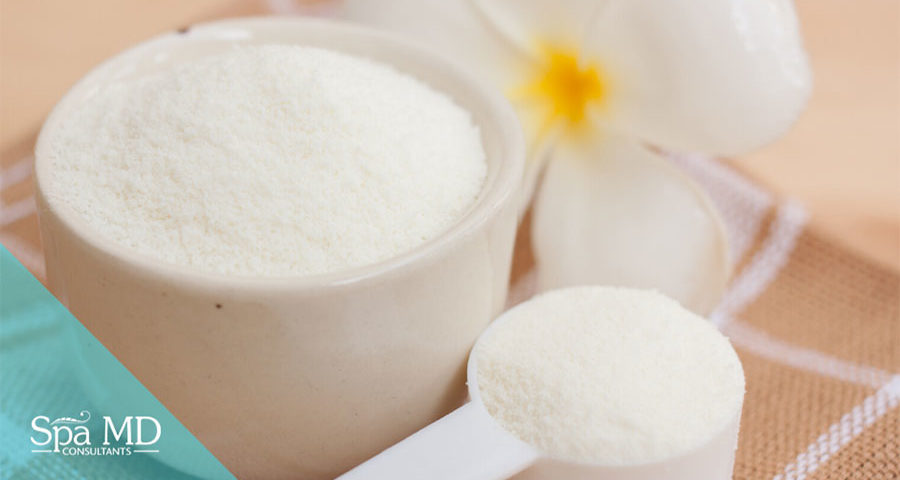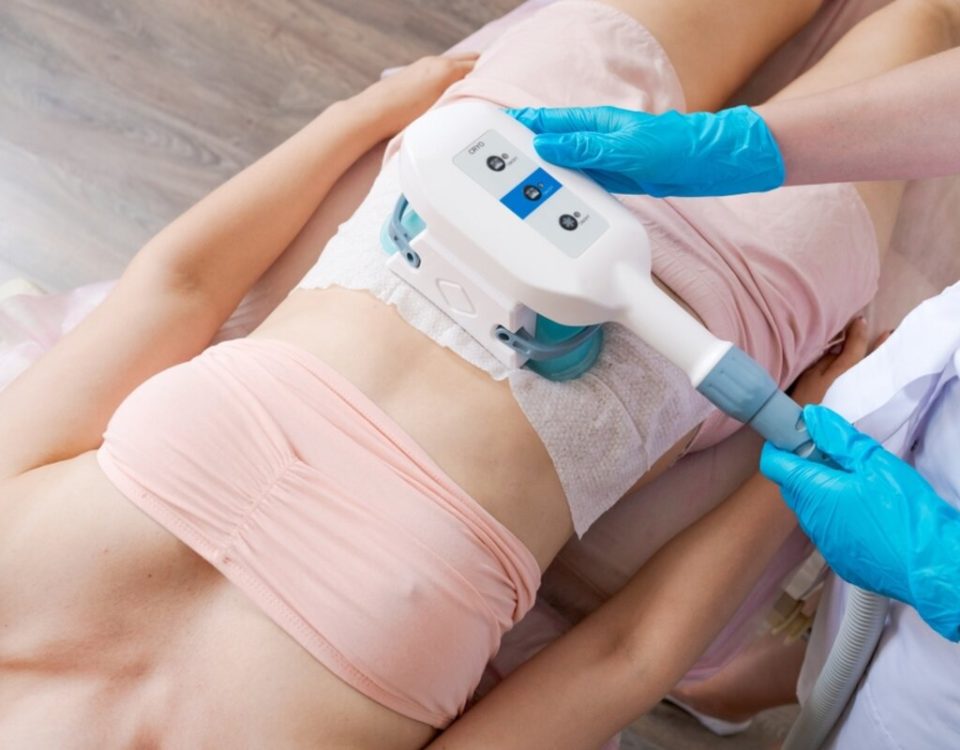
Sunscreen Products You Can Use in the Winter to Protect Your Skin
November 13, 2019
5 Most Common Skin Conditions (and How to Fight Them)
December 18, 2019One primary goal of modern skincare is to avoid aging. If you want to preserve your facial skin well into (and beyond) your more mature years, taking steps toward protecting your collagen levels can help. Here is what you need to know about collagen—including collagen-boosting treatments to add to your skincare routine.
What is Collagen?
When it comes to your skin, protein is one of the primary building blocks. Protein is responsible for supporting your muscles, cartilage, blood, and bones, too, and your body creates its own.
The thing is, as you age, your body’s collagen production slows down. Mature skin develops wrinkles and weakened cartilage because collagen isn’t protecting it anymore. But with restorative collagen treatment, your skin can look younger and more vibrant.
How Does Collagen Help Skin?
Collagen is instrumental in keeping your skin healthy so it’s able to protect your system. The proteins your skin contains help create a barrier against environmental elements and keep you looking fresh and vibrant. Here are a few other ways collagen helps the skin—and body.
Resist Environmental Damage
The more collagen your skin contains, the higher its elasticity and ability to resist damage. Instead of allowing germs in through cracks in dry, vulnerable skin, collagen keeps skin hydrated and resilient.
And while collagen doesn’t provide UV protection, it does make your skin less likely to “dry up” from long-term sun exposure. Still, proper skin protection—via sunscreen and UV-resistant clothing—is vital for your skin and overall health.
Reduce Bruising
Collagen fibers also protect your blood vessels, the source of unsightly bruising when you hit your head or even pick at a blemish. Therefore, you have lower odds of developing bruising with higher levels of collagen.
Avoid Signs of Aging
Laugh lines may be a sign of life well-lived, but at the same time, they make many people feel self-conscious about their appearance. After all, wrinkles are often the first sign of aging and one that is tough to handle
The effects of sunlight and environmental exposure can also do a number on the delicate skin on your face. Acne or oily skin troubles also contribute to scarring, pockmarks, and other surface damage.
But all along, your skin’s collagen has been fighting back against such impacts. And the protein can continue to support your skin’s health—if you find ways to encourage its growth.
Achieve Healthy Hair
Because it exists throughout the body, collagen also affects your hair growth and scalp health. Studies have shown that some peptides, which are like tiny proteins, help stimulate collagen. Applying such products to the scalp helped people grow longer, stronger hair.
Promote Joint Health
While skin aging and joint problems tend to go hand in hand, so does collagen and internal health. Collagen helps boost joint health, ensuring you can move smoothly and effectively lubricating your bones.
Because connective tissues—tendons, cartilage, and bones—are responsible for keeping your body moving smoothly, having enough collagen is essential. Plus, the three central connective tissues in the body include collagen, elastic, and reticular fibers—the real building blocks of your internal system.
Of course, the connective tissue isn’t just inside your elbows and knees. Plenty of your facial skin is connective tissue, and it’s the most noticeable of them all. Therefore, most people focus on the face when addressing low collagen levels.
Medical Use of Collagen
It might seem crazy that a supplement or procedure can help increase your body’s collagen stores. But collagen treatment comes with the support of many scientists and healthcare professionals. Doctors use and trust various forms of collagen for:
- Filling out and smoothing skin, such as in facial fillers
- Wound dressing
- Regenerating tissue
- Prosthetics for nerves and arteries
- Osteoarthritis treatment
Of course, skincare is also a significant area for treatments with collagen. From treating burn patients to reducing signs of aging and eliminating acne scarring, collagen has many uses and benefits.
How to Avoid Collagen Loss
Protecting your body’s collagen stores involves smart skincare steps. Tips for preventing excess collagen loss include:
- Using adequate sun protection—and avoiding the hottest rays
- Stopping (or not starting) smoking to promote oxygenation of your skin
- Reducing the amount of sugar you eat, as it can damage your body’s proteins
Avoiding damage is straightforward, but the fact is that time is still the biggest influence on collagen damage. Genetics plays a part, too, and some people are unluckier than others.
The fact is many skincare strategies and routines can help you avoid losing more collagen. But if you’re not regenerating it on your own, you will still experience less elastic and more wrinkled skin.
But if you don’t have much collagen naturally, you’re probably wondering how to restore collagen in the face through other methods. Collagen treatments are an effective way to rejuvenate skin and jump-start your body’s rebuilding efforts.
How to Restore Collagen in the Face
When it comes to figuring out how to stimulate collagen production in the skin, scientists are all over it. From oral collagen supplements to topical creams and skincare practices, there are many ways to address collagen loss.
Use Your Body’s Existing Resources
The best collagen treatment for skin may even start with your body’s innate cell functions. Using your body’s existing resources can help promote growth and regeneration—no supplementation required. For example, a Platelet Rich Plasma facial uses your platelet-rich plasma to encourage skin healing and collagen production.
Skincare experts also learned how to rebuild collagen in the face with a virtually painless process that enhances your skin’s natural collagen building efforts. Microneedling uses microscopic needles to stimulate the skin’s healing process.
As the skin rushes to “heal” itself from these tiny “wounds,” your system kicks into gear, generating more proteins and compounds to boost both collagen and elastin stores. And by relying on the way your body naturally protects and rebuilds itself, you can avoid becoming dependent on products to keep you looking rejuvenated.
Supplements and Creams
While dermatological procedures are often the most effective way to jump-start collagen production, many creams and supplements claim to help, too. Of course, there are many questions about such products’ safety and ability to heal your facial skin, and new research continues to try to answer them.
One review in the Journal of Drugs in Dermatology concluded that using oral collagen supplements has promising results for skin. Such supplements can help increase skin elasticity, hydration, and “dermal collagen density,” the researchers noted.
Taking collagen is also “generally safe,” they say while noting that more research is still necessary.
Topical creams can also help increase hydration in your skin and reduce signs of aging. The results you experience depend on many factors, though, such as:
- Ingredients and concentration of peptides and other proteins
- The duration of the treatment
- Any reactions you have to the ingredients, which can cover up or prevent the benefits of collagen from showing
- The type of collagen; most creams use beef or fish collagen
- Other skin-healing compounds available in the formula
Collagen lotions, treatments, and facials can also be expensive, and it can take some time before you see results.
Final Thoughts
For many people, collagen treatment is the perfect method of reducing signs of aging and ensuring healthier skin throughout their lives. Is in-office collagen treatment the ideal skincare fix for you? Contact us today for a consultation.
New Clients:
$35 deposit for all new clients
Cancellation/No Show Policy:
$35 fee for all no show, no call and any cancellations less than 24hrs before the start of your appointment.Any prepaid services will be forfeited.
Call us at +1(651)222-4490
Email us at SpaConsultantsMD@gmail.com
or, Schedule a free consultation
We are located on the main level inside of the Blair Arcade Building. We validate parking in the lot connected to the building off of Selby. Be sure to bring your ticket in with you!
Business Hours:
Monday: 9:00am - 8:00pm
Tuesday: 9:00am - 5:00pm
Wednesday: 9:00am - 8:00pm
Thursday: 9:00am - 8:00pm
Friday: 10:00am - 5:00pm
Saturday: 9:00am - 2:00pm (3 Saturdays per month- please call or email for more information)




